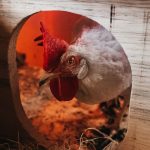Chickens, like all animals, have specific requirements for cold weather survival. Understanding these needs is essential for maintaining the health and well-being of a flock during winter months. While chickens are generally hardy birds, they remain vulnerable to cold weather effects.
As temperatures decrease, chickens need additional care to stay warm and healthy. Chickens are more susceptible to drafts and dampness than to cold temperatures alone. Providing adequate shelter, insulation, and ventilation is crucial for their comfort and safety in winter.
Access to fresh water and nutritious food is vital for maintaining body temperature and energy levels. During cold weather, chickens consume more food to generate heat, necessitating a balanced diet rich in protein and carbohydrates. A dry and clean environment is necessary to prevent frostbite and other cold-related health issues.
By comprehending and addressing the specific needs of chickens in cold weather, flock owners can take appropriate measures to ensure their chickens remain healthy and content throughout the winter season.
Table of Contents
- 1 Providing proper shelter and insulation for chickens
- 2 Using heat lamps and other heating methods
- 3 Ensuring adequate ventilation while keeping chickens warm
- 4 Providing extra bedding and nesting materials
- 5 Offering warm water and nutritious food
- 6 Monitoring the health and behavior of chickens during cold weather
- 7 FAQs
- 7.1 What are the best ways to keep chickens warm in cold weather?
- 7.2 What temperature is too cold for chickens?
- 7.3 How can I insulate my chicken coop to keep it warm?
- 7.4 Are there any specific breeds of chickens that are better suited for cold weather?
- 7.5 What should I feed my chickens to help keep them warm in cold weather?
Key Takeaways
- Chickens need extra care in cold weather due to their susceptibility to frostbite and respiratory issues
- Proper shelter with insulation, such as straw or wood shavings, is essential to protect chickens from the cold
- Heat lamps and heated waterers can help maintain a comfortable temperature for chickens
- Adequate ventilation is crucial to prevent moisture buildup and ammonia levels in the coop
- Extra bedding, such as hay or pine shavings, and nesting materials provide warmth and comfort for chickens
- Warm water and nutritious food, including grains and high-protein treats, help chickens maintain their body temperature
- Regularly monitor chickens for signs of illness, such as lethargy or decreased egg production, and adjust care as needed
Providing proper shelter and insulation for chickens
Insulating the Coop
Insulating the walls, ceiling, and floor of the coop can help retain heat and keep the interior temperature stable. Additionally, providing a thick layer of bedding such as straw or wood shavings will help insulate the coop and provide a cozy environment for your chickens.
Providing a Secure Outdoor Space
In addition to a well-insulated coop, it’s important to provide a secure outdoor run or yard for your chickens to get some fresh air and exercise during the winter. This outdoor space should be protected from wind and snow, and ideally covered with a roof or tarp to provide additional shelter from the elements.
Why Proper Shelter and Insulation Matter
Providing proper shelter and insulation for your chickens is crucial for keeping them warm and healthy during the winter months. By taking the time to create a comfortable and secure living environment for your flock, you can help them stay happy and productive throughout the colder months.
Using heat lamps and other heating methods

In extremely cold climates, using heat lamps or other heating methods can help supplement the warmth in the chicken coop. Heat lamps should be used with caution as they can be a fire hazard if not properly installed and monitored. It’s important to position heat lamps at a safe distance from any flammable materials such as bedding or wood.
Additionally, using thermostatically controlled heaters can provide a safer alternative for heating the coop without the risk of fire. Another heating method that can be used in chicken coops is radiant floor heating. This method involves installing heating elements beneath the floor of the coop to provide consistent warmth from below.
Radiant floor heating can help keep the coop floor dry and warm, which is essential for preventing frostbite and other cold-related health issues in chickens. When using any heating method in the chicken coop, it’s important to regularly check for malfunctions or hazards to ensure the safety of your flock. In extremely cold climates, using heat lamps or other heating methods can help supplement the warmth in the chicken coop.
Heat lamps should be used with caution as they can be a fire hazard if not properly installed and monitored. It’s important to position heat lamps at a safe distance from any flammable materials such as bedding or wood. Additionally, using thermostatically controlled heaters can provide a safer alternative for heating the coop without the risk of fire.
Another heating method that can be used in chicken coops is radiant floor heating. This method involves installing heating elements beneath the floor of the coop to provide consistent warmth from below.
Ensuring adequate ventilation while keeping chickens warm
While it’s important to keep chickens warm during cold weather, it’s equally important to ensure adequate ventilation in the coop. Proper ventilation helps remove excess moisture from the air, which can lead to dampness and respiratory issues in chickens. Ventilation also helps regulate the temperature inside the coop by allowing fresh air to circulate while removing stale air.
To ensure adequate ventilation in the chicken coop, consider installing adjustable vents or windows that can be opened or closed as needed. This allows you to control airflow based on the weather conditions while still maintaining a comfortable environment for your flock. It’s important to strike a balance between keeping your chickens warm and ensuring proper ventilation to prevent moisture buildup and respiratory problems.
While it’s important to keep chickens warm during cold weather, it’s equally important to ensure adequate ventilation in the coop. Proper ventilation helps remove excess moisture from the air, which can lead to dampness and respiratory issues in chickens. Ventilation also helps regulate the temperature inside the coop by allowing fresh air to circulate while removing stale air.
Providing extra bedding and nesting materials
During cold weather, providing extra bedding and nesting materials in the chicken coop can help keep your flock warm and comfortable. A thick layer of bedding such as straw or wood shavings provides insulation against the cold floor and helps retain heat in the coop. Additionally, providing extra nesting materials such as hay or shredded paper can help keep eggs warm and prevent them from freezing in cold temperatures.
It’s important to regularly check and replace bedding as needed to ensure that it remains dry and clean. Wet bedding can lead to dampness in the coop, which can contribute to respiratory issues in chickens. By providing extra bedding and nesting materials, you can create a cozy environment for your flock while helping them stay warm and healthy during the winter months.
During cold weather, providing extra bedding and nesting materials in the chicken coop can help keep your flock warm and comfortable. A thick layer of bedding such as straw or wood shavings provides insulation against the cold floor and helps retain heat in the coop. Additionally, providing extra nesting materials such as hay or shredded paper can help keep eggs warm and prevent them from freezing in cold temperatures.
Offering warm water and nutritious food

Providing Warm Water and Nutritious Food
In cold weather, it’s essential to provide your chickens with access to warm water and nutritious food to help them maintain their body temperature and energy levels. Chickens will consume more food in cold weather to generate heat, so it’s crucial to provide them with a balanced diet that includes plenty of protein and carbohydrates.
Preventing Dehydration and Maintaining Energy
Additionally, offering warm water instead of cold water can help prevent dehydration in freezing temperatures. Providing nutritious food such as grains, seeds, fruits, and vegetables can help keep your flock healthy and energized during the winter months.
Keeping Water from Freezing
To keep water from freezing, consider using heated waterers or regularly replacing frozen water with fresh warm water throughout the day. This will ensure your chickens always have access to the warm water they need to stay healthy and thrive.
Monitoring the health and behavior of chickens during cold weather
During cold weather, it’s important to regularly monitor the health and behavior of your chickens to ensure that they are coping well with the colder temperatures. Keep an eye out for signs of distress such as shivering, lethargy, or decreased egg production, which could indicate that your flock is struggling with the cold. Additionally, regularly inspect your chicken coop for signs of dampness or drafts that could affect the comfort of your flock.
By staying vigilant and proactive in monitoring the health and behavior of your chickens during cold weather, you can quickly address any issues that arise and ensure that your flock stays healthy throughout the winter. During cold weather, it’s important to regularly monitor the health and behavior of your chickens to ensure that they are coping well with the colder temperatures. Keep an eye out for signs of distress such as shivering, lethargy, or decreased egg production, which could indicate that your flock is struggling with the cold.
In conclusion, understanding the specific needs of chickens in cold weather is essential for ensuring their health and well-being during the winter months. By providing proper shelter, insulation, heating methods, ventilation, bedding, water, and food, you can create a comfortable environment for your flock while helping them stay warm and healthy throughout the colder seasons. Regular monitoring of your chickens’ health and behavior will also allow you to quickly address any issues that arise and ensure that your flock stays happy and productive during cold weather.
With proper care and attention, you can help your chickens thrive even in chilly temperatures.
If you’re interested in learning more about poultry breeding, you might want to check out this article on how many eggs geese lay. It’s important to understand the reproductive habits of different poultry species in order to properly care for them and ensure their well-being.
FAQs
What are the best ways to keep chickens warm in cold weather?
Some of the best ways to keep chickens warm in cold weather include providing a well-insulated coop, using heat lamps or heated pads, and ensuring good ventilation while avoiding drafts.
What temperature is too cold for chickens?
Chickens can generally tolerate cold temperatures as long as they have a dry and draft-free coop. However, temperatures below 0°F (-18°C) can be dangerous for chickens, especially if they are not acclimated to such extreme cold.
How can I insulate my chicken coop to keep it warm?
You can insulate your chicken coop by adding extra bedding, sealing any drafts, and using insulating materials such as foam board or reflective insulation. It’s important to ensure that the coop remains well-ventilated despite the insulation.
Are there any specific breeds of chickens that are better suited for cold weather?
Yes, some chicken breeds are better suited for cold weather due to their cold-hardy characteristics. Breeds such as the Rhode Island Red, Plymouth Rock, and Orpington are known for their ability to withstand colder temperatures.
What should I feed my chickens to help keep them warm in cold weather?
Feeding your chickens a balanced diet that includes high-energy foods such as grains and seeds can help them generate body heat to stay warm in cold weather. Additionally, providing access to fresh water is crucial for maintaining their body temperature.
Meet Walter, the feathered-friend fanatic of Florida! Nestled in the sunshine state, Walter struts through life with his feathered companions, clucking his way to happiness. With a coop that’s fancier than a five-star hotel, he’s the Don Juan of the chicken world. When he’s not teaching his hens to do the cha-cha, you’ll find him in a heated debate with his prized rooster, Sir Clucks-a-Lot. Walter’s poultry passion is no yolk; he’s the sunny-side-up guy you never knew you needed in your flock of friends!







